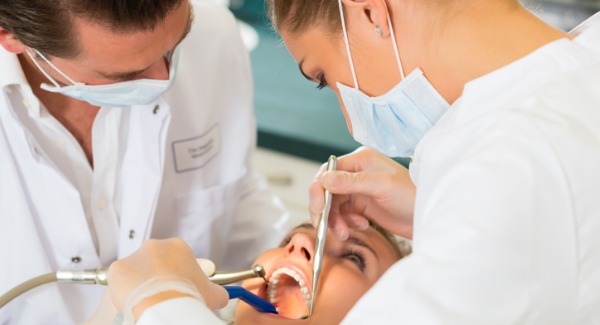What is a Dental Assistant?
A dental assistant is a vital member of the dental healthcare team who works closely with dentists and dental hygienists to provide quality patient care. Their primary role is to assist dentists during dental procedures by preparing the treatment area, handing instruments to the dentist, and ensuring the comfort of patients.
In addition to their clinical and administrative responsibilities, dental assistants serve as a key point of contact for patients, providing reassurance, answering questions, and addressing concerns. They possess excellent communication skills and demonstrate empathy and professionalism in their interactions with patients of all ages. Dental assistants must also stay abreast of advancements in dental technology and procedures to effectively support dentists in delivering high-quality dental care.
Get online training through our partner:
What does a Dental Assistant do?

Duties and Responsibilities
The duties and responsibilities of a dental assistant can vary depending on the specific needs of the dental practice and state regulations. However, common duties and responsibilities of dental assistants include:
- Chairside Assistance: Assisting dentists during patient examinations and procedures by preparing the treatment area, handing instruments, and providing suction or other assistance as needed.
- Patient Care: Taking patient medical histories, recording vital signs, and explaining dental procedures to patients to ensure their comfort and understanding.
- Sterilization and Maintenance: Sterilizing dental instruments and equipment, maintaining dental supplies inventory, and ensuring compliance with infection control protocols to maintain a clean and safe working environment.
- Radiography: Taking dental x-rays and processing them for diagnostic purposes under the direction of the dentist.
- Dental Impressions: Assisting with taking dental impressions for the fabrication of dental prosthetics such as crowns, bridges, and dentures.
- Administrative Tasks: Scheduling appointments, managing patient records, processing billing and insurance claims, and coordinating communication between the dental office and patients.
- Patient Education: Providing oral hygiene instructions, post-operative care instructions, and answering patient questions about dental procedures and treatments.
- Laboratory Work: Assisting with the fabrication and repair of dental prosthetics in the dental laboratory, such as pouring and trimming dental models.
- Emergency Preparedness: Assisting with medical emergencies in the dental office by providing basic first aid and CPR as needed.
- Office Support: Assisting with general office tasks such as answering phones, greeting patients, and maintaining a clean and organized reception area.
Types of Dental Assistants
There are several types of dental assistants, each with specific roles and responsibilities within the dental practice. Here are some common types:
- Chairside Dental Assistant: These assistants work directly alongside dentists during patient examinations and procedures, providing chairside assistance by handing instruments, suctioning, and ensuring patient comfort.
- Orthodontic Assistant: Orthodontic assistants specialize in assisting orthodontists with procedures related to correcting dental and facial irregularities, such as installing braces, taking impressions, and adjusting appliances.
- Oral Surgery Assistant: Oral surgery assistants work with oral surgeons, assisting in surgical procedures such as tooth extractions, dental implant placement, and jaw surgeries. They may also provide pre-operative and post-operative care to patients.
- Expanded Functions Dental Assistant (EFDA): EFDA-certified dental assistants have received additional training and certification to perform advanced clinical tasks such as placing fillings, taking impressions, and applying sealants under the direct supervision of a dentist.
- Pediatric Dental Assistant: Pediatric dental assistants specialize in providing care to children and adolescents, assisting pediatric dentists with procedures tailored to young patients and helping to create a positive and comfortable dental experience for children.
- Dental Radiology Assistant: These assistants specialize in taking and processing dental x-rays, ensuring high-quality images for diagnostic purposes and assisting in the interpretation of radiographic findings.
- Dental Administrative Assistant: While not directly involved in clinical procedures, dental administrative assistants play a crucial role in the smooth operation of the dental office by managing appointments, handling patient records, processing billing and insurance claims, and providing customer service to patients.
- Dental Hygiene Assistant: Dental hygiene assistants work alongside dental hygienists, assisting with procedures such as cleanings, fluoride treatments, and periodontal assessments. They may also provide patient education on oral hygiene and assist with the application of dental sealants.
What is the workplace of a Dental Assistant like?
The workplace of a dental assistant typically encompasses a dental office or clinic setting, where they work alongside dentists, dental hygienists, and other dental professionals. Dental assistants may also find employment opportunities in specialty dental practices such as orthodontics, oral surgery, or pediatric dentistry. The work environment is typically clean, well-lit, and organized, with state-of-the-art dental equipment and technology to facilitate patient care.
Dental assistants spend much of their time in treatment rooms, where they assist dentists during patient examinations and procedures. They may also work in laboratory areas, where they sterilize instruments, prepare dental materials, and assist with the fabrication of dental prosthetics. Additionally, dental assistants may spend time at the front desk, handling administrative tasks such as scheduling appointments, managing patient records, and processing billing and insurance claims.
The workplace of a dental assistant is dynamic and fast-paced, with a constant flow of patients coming in for appointments throughout the day. Dental assistants must be adaptable and able to multitask efficiently to meet the needs of both patients and dental professionals. Interpersonal skills are also essential, as dental assistants interact regularly with patients, providing reassurance, answering questions, and ensuring their comfort and satisfaction throughout their visit.